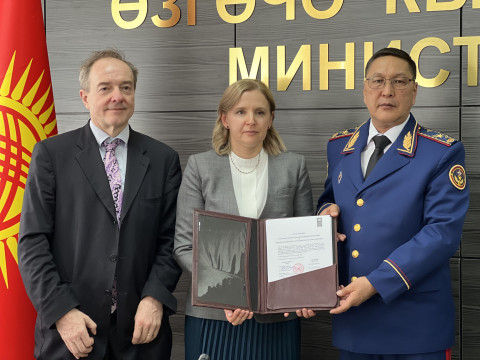
GCED Basic Search Form
Quick Search
You are here
News

Bishkek, 11 April 2024 – In a significant step towards bolstering disaster management and resilience capabilities in Central Asia, the United Nations Development Programme (UNDP) handed over IT equipment to the Ministry of Emergency Situations of the Kyrgyz Republic. This ceremony, held under the Climate Change and Resilience in Central Asia project funded by the European Union (EU), symbolizes a strengthened collaboration between the two entities in the shared pursuit of enhancing climate resilience and disaster preparedness in the region.
Mr. Boobek Azhikeev, Minister of Emergency Situations, expressed his gratitude for the equipment provided and comprehensive support in increasing the capacity of the Ministry of Emergency Situations and expressed hope for further cooperation.
Ms. Alexandra Solovieva, UNDP Resident Representative in Kyrgyzstan, emphasized the important nature of this collaboration in her opening remarks: “Climate change presents the Central Asian region with significant challenges, and it is critical that the bodies responsible for forecasting, monitoring and response are equipped with the necessary tools to successfully overcome these challenges. Today we are handing over IT equipment as an integral part of the overall system for monitoring natural processes related to climate change to ensure sustainability. These tools will make a huge difference in all aspects of emergency response, enabling informed decisions to be made at critical moments."
Hans Farnhammer, Head of Cooperation at the EU Delegation in Kyrgyzstan said: “European Union and Kyrgyzstan partner up for climate resilience in Fergana valley. This aligns with the European Union’s commitment to improve disaster management and enhance climate resilience in Central Asia”.
The Climate Change and Resilience in Central Asia project, funded by the European Union, is an initiative that underscores the joint commitment of UNDP and regional stakeholders to enhance cooperation and resilience in the face of climate challenges. The project concentrates on improving knowledge, integrating climate considerations into policy-making, fostering regional cooperation, and demonstrating effective early warning and prevention strategies. Its efforts are particularly crucial in the Ferghana Valley, aiming to build a more secure and climate-resilient future for the communities there.
Building on these efforts, the UNDP has outlined plans to provide additional support to MES KR. This includes transferring early warning system equipment and crisis management tools to the Ministry's Crisis Management Centre. By focusing on enhancing early warning and prevention measures at specific pilot sites, this initiative demonstrates a commitment to fortify regional preparedness and response capacities against climate-related risks.
The handover ceremony served as a platform for UNDP and the Ministry of Emergency Situations KR to express their united stance on continuing their collaborative efforts toward a more secure and resilient future. This event highlighted the essential role of collaborative action and a unified vision in effectively tackling the complex challenges posed by climate change.
The Climate Change and Resilience in Central Asia project aims to strengthen cooperation and resilience among local and regional stakeholders. With a focus on advancing knowledge, facilitating policy integration, promoting regional cooperation, and demonstrating early warning and prevention measures, the project is pivotal for building a more secure and climate-resilient future, especially in the Ferghana Valley.
More information about the project: https://www.undp.org/eurasia/projects/climate-change-and-resilience-central-asia
